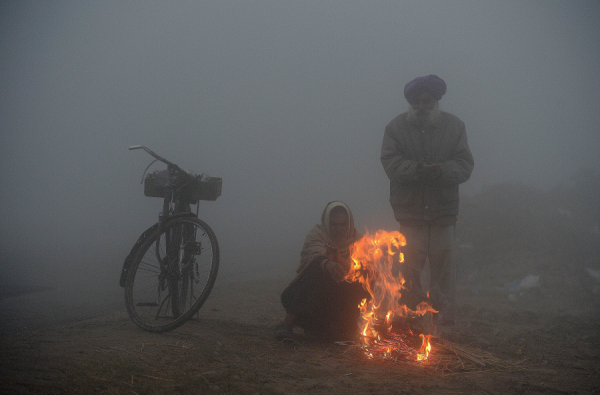
Recent days have seen the worst fighting between India and Pakistan in over a decade, but there is reason to believe that the heightened tension in Kashmir will most likely subside in the coming weeks. Indian Prime Minister Narendra Modi was harshly criticized by his opponents when he brushed off a question regarding the skirmishes with “everything will be fine soon.” However, Modi is right; powerful actors on both sides of the conflict, namely the Pakistani military and the Hindu-nationalist Modi regime, are invested in preventing an all-out war, almost to the same degree that they are interested in curtailing a full normalization of relations between the two nuclear armed states. The current tensions can be best understood as a course correction toward the historic status quo, after a series of warm diplomatic overtures from Pakistani Prime Minister Nawaz Sharif towards the newly elected Prime Minister Modi.
The 2013 election of Nawaz Sharif, and subsequent plans to grant India Most Favored Nation status that would significantly boost bilateral trade, brought optimism to the public discourse on India-Pakistan relations. The Sharif government has consistently shown an eagerness to normalize relations with India, without insisting on first crossing the hurdle of the Kashmir dispute. Sharif finds little support from Pakistan’s military or across the Indian border. Better trade and transport with India fits neatly with Sharif’s pro-business party manifesto, not to mention the potential personal benefits the Sharif clan could accrue as owners of one of the largest business conglomerates in the country. The third-time Prime Minister has a history of making efforts to improve commerce and cultural links between the two historic rivals: after their respective nuclear tests soured relations, Sharif made a concerted effort to improve relations with India, which in 1999 culminated in a visit from then Indian Prime Minister Atal Bihari Vajpayee on the inaugural run of the landmark Delhi-Lahore bus service. The Indian premiere was received by Sharif in a historically warm welcome at the border (which was tellingly boycotted by Pakistan’s military chiefs). The meeting resulted in the Lahore Declaration, a bilateral agreement widely hailed as a breakthrough in the improvement of strained relations between the newly nuclear armed neighbors. Public on both sides of the border enthusiastically received the Declaration, as well as the resumption of cricket matches between the two countries after a decade-long suspension.
The Pakistani military, on the other hand, continues to be wary of all civilian initiatives of peace with India. Despite the historic strides toward peace initiated by Pakistan’s premier, the year 1999 saw the Kargil conflict bring the two nations to the brink of full-blown war, and ended with the overthrow of Nawaz Sharif by then-Chief of Army Staff General Musharraf. This time around, Sharif’s endeavors to improve relations with India once again put him at odds with the military. Pakistan’s military enjoys its reputation as the country’s most efficient institution, the guardian of the state, and the final mediator of internal conflicts. A large part of this image derives from having a neighbor that is perceived to pose a constant strategic and national security threat to Pakistan. The military’s opposition to a normalization of ties with India, as long as the Kashmir dispute remains unresolved, is certainly ideological, but it is also grounded in strategic reasons of self-interest. The current cross-border tensions, coupled with Pakistan’s ongoing internal political turmoil, provide just the right amount of friction needed to halt the diplomatic overtures towards India by Sharif.
Of course, it takes two to tango, and Modi has yet to disappoint. When the Hindu-nationalist leader rose to a historic victory on a pro-business agenda, many in Pakistan had hoped that his business acumen would win over attempts to consolidate Hindu right-wing support and that Modi may pursue a strengthening of economic ties with Pakistan. This, however, has not come to pass. Modi’s invitation to Sharif for his inauguration was seen as a positive first step, and despite goodwill gestures like exchanging presents for each other’s mothers and Sharif sending over cases of top-quality Pakistani mangoes, the relations have taken a turn for the worse.
In August, India cancelled high-level talks between the two foreign secretaries after the Pakistani High Commissioner met with leaders from the Hurriyat Conference, Kashmir’s largest separatist group. The meeting between the Pakistani High Commissioner and Kashmiri separatist leaders has a decades-long precedent, and the cancellation of talks in retaliation came as a shock to Pakistani policymakers. The response, which resulted in a suspension of Pakistan’s plan to grant India Most Favored Nation status, signals the likelihood that despite the conciliatory rhetoric, when it comes to Pakistan and Kashmir, Modi is prioritizing his Hindu-nationalist credentials over his reputation for a strong economic vision. This is also evidenced by Modi’s selection of hard-liner former intelligence officer Ajit Doval as National Security Advisor. Doval’s appointment is in line with BJP’s more aggressive foreign policy and their calls to end the exceptional autonomy granted to Kashmir under Article 370 of the Indian Constitution. Thus, on Pakistan, Modi appears to be playing to his right-win domestic audiences.
Yet none of the actors involved in India or Pakistan would benefit from a full-scale military engagement. Pakistan has clearly articulated as much, despite fiery rhetoric on both sides of the Line of Control. Power-brokers on both sides have more to gain from restoring the perception of a threat. Once the dust settles after this recent bout of violence, a precarious cold peace will return to the border. While better than conflict, it will remain a far cry from the warm neighborly relations that many had dared to hope for this time.
***
Image: Tauseef Mustafa-AFP, Getty